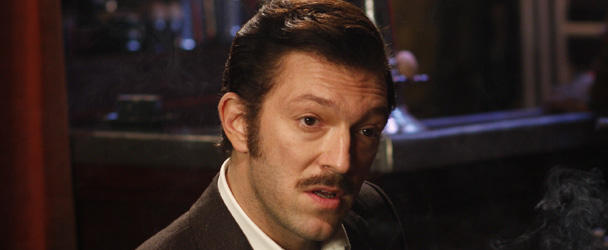Mesrine: Killer Instinct
Cassel dominates the screen but I can’t help but feel that there is a glitch somewhere in the overall product.
Plot summary
The story of french gangster Jacques Mesrine, before he was called public enemy number one.

Like Gerard Depardieu and Jean Reno before him, Vincent Cassel joins Juliette Binoche and Audrey Tautou as among today’s foremost French actors on the international scene. Nearly fifteen years on from his bristling depiction of a furious young Parisian banlieusard in Matthieu Kassovitz’s blistering La Haine, he has risen, quietly, into the wider filmic stratosphere, earning himself a respectable place straddling the anglo/francophone film world. His most recent Hollywood jaunts have taken him to both Ocean’s Twelve and Thirteen as well as starring alongside Viggo Mortensen in David Cronenberg’s Eastern Promises. In his latest film, a two-part biopic of the notorious French gangster and infamous media icon Jacques Mesrine who got plastered with police bullets in the centre of Paris in 1979, Cassel takes centre-stage.
The first half, Mesrine: Killer Instinct, traces the young Mesrine from his shady formative experiences in the Algerian war through to his initial forays into the underbelly of Parisian gangland under the apprenticeship of Depardieu’s bloated king-pin, Guido. Handsome and charming, Mesrine glides fluently into the neon world of easy money and femme-fatales, in spite of his quite comfortable affluent bourgeois origins. Beautiful women flock to him like moths to a light bulb but he discards all but those willing to share his illicit and daring lifestyle of bank robberies and kidnappings. After pulling off a particularly audacious heist, he and his love, Jeanne (Cecile de France), flee to Canada on the hunt for bigger and more treacherous possibilities.
Ostensibly, this film is too good to be true. The entire script is lifted and adapted from the autobiography of Jacques Mesrine, documenting in candid and brutal detail the myriad crimes, gruesome murders, daring heists and unfathomable escapes of his astonishing life. However, this is where a fatal paradox befalls the film: it is this farfetchedness – or perhaps more accurately, the seeming familiarity and congruence with the world of the Hollywood gangster/crime/prison films – which renders the film simply not that surprising or exciting. That it is split into two, two hour films really hampers the pacing, and for my money, struggles to uphold attention at all times. Almost everything that happens, the police chases, prison torture scenes and bank heists have been seen a hundred and one times before and so very rarely does the film actually feel new or authentic; it’s all just a little too familiar and not in a knowing, allusive way, but in a conventional and disappointing way.
Cassel, on the other hand dominates the screen; his physical adaptation and development over the film is striking; he exhibits subtle flickers and flashes of the man described as ‘the man of a thousand faces’, however, I can’t help but feel that there is a glitch somewhere in the overall product.
Director Jean-Francios Richet, director of Assault Precinct 13 claims Mesrine is ‘a mature work’ – that he has a ‘less Manichean vision than before’, but I can’t help but feel he has dropped a dualistic approach in favour for a more, albeit multifaceted, but compartmentalised and limiting generic approach. Of course much of this comes down to personal taste, and it’s not a bad film; the action sequences look good and the film is suitably provocative at times, but the cinematography – like much of its content – is conventional. The opening sequence, for instance, portrays the minutes preceding Mesrine’s fatal termination in the middle of Paris; the screen bisects and multiplies as we see the same shot – just out of sync – from various angles. A nice, if not a tad hackneyed, touch if it wasn’t dragged out for far too long and repeated numerous times later in the film to the same, tedious effect.
This is, however, the first half. Perhaps after seeing the film in its entirety, I’ll reconsider, but at this point, I can’t help but feel a little disappointed.











COMMENTS